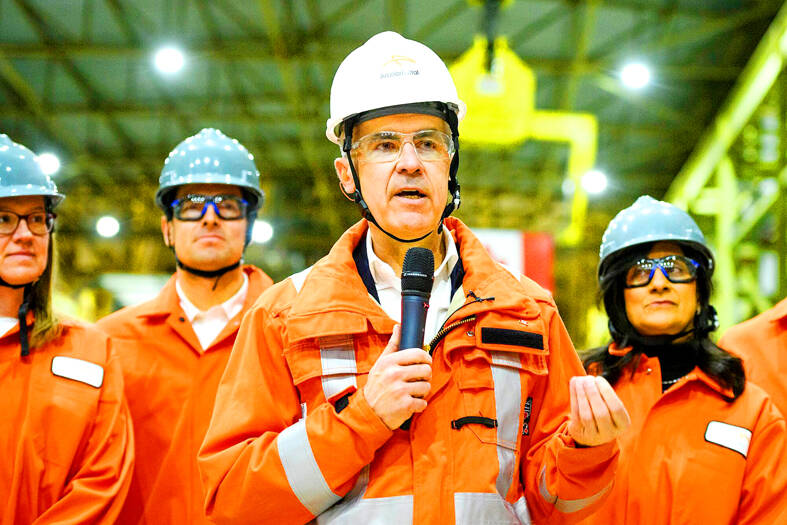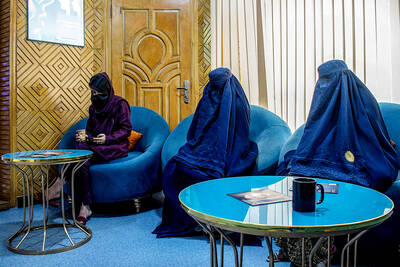Major trade partners swiftly hit back at US President Donald Trump’s increased tariffs on aluminum and steel imports, imposing stiff new taxes on US products from textiles and water heaters to beef and bourbon.
Canada, the largest supplier of steel and aluminum to the US, on Wednesday said that it would place 25 percent reciprocal tariffs on steel products and also raise taxes on a host of items: tools, computers and servers, display monitors, sports equipment and cast-iron products.
Across the Atlantic, the EU said it would raise tariffs on US beef, poultry, bourbon, motorcycles, peanut butter and jeans.

Photo: Bloomberg
Combined, the new tariffs would cost companies billions of dollars, and further escalate the uncertainty in two of the world’s major trade partnerships. Companies would either take the losses and earn fewer profits, or more likely pass costs along to consumers in the form of higher prices.
Prices would go up, in Europe and the US, and jobs are at stake, European Commission President Ursula von der Leyen said.
“We deeply regret this measure. Tariffs are taxes. They are bad for business, and even worse for consumers,” Von der Leyen said.
The EU duties aim for pressure points in the US while minimizing additional damage to Europe.
EU officials have made clear that the tariffs — taxes on imports — are aimed at products made in Republican Party-held states, such as beef and poultry from Kansas and Nebraska, and wood products from Alabama and Georgia.
The tariffs would also hit blue states such as Illinois, the No. 1 US producer of soybeans, which are also on the list.
Spirits producers have become collateral damage in the dispute over steel and aluminum.
The EU move “is deeply disappointing and will severely undercut the successful efforts to rebuild US spirits exports in EU countries,” Distilled Spirits Council president Chris Swonger said.
The EU is a major destination for US whiskey, with exports surging 60 percent in the past three years after an earlier set of tariffs was suspended.
Incoming Canadian prime minister Mark Carney on Wednesday said he is ready to meet with Trump if he shows “respect for Canadian sovereignty” and is willing to take “a common approach, a much more comprehensive approach for trade.”
Carney, who is to be sworn in in the coming days, said workers in both countries would be better off when “the greatest economic and security partnership in the world is renewed, relaunched. That is possible.”
Trump slapped similar tariffs on EU steel and aluminum during his first term in office, which enraged European and other allies.
The EU also imposed countermeasures in retaliation at the time, raising tariffs on US-made motorcycles, bourbon, peanut butter and jeans, among other items.
This time, the EU action would involve two steps. First on April 1, the commission would reimpose taxes that were in effect from 2018 and 2020, but which were suspended during former US president Joe Biden’s administration. Then on April 13 come the additional duties targeting 18 billion euros (US$19.6 billion) in US exports to the bloc.
EU Commissioner for Trade and Economic Security Maros Sefcovic traveled to Washington last month in an effort to head off the tariffs, meeting with US Secretary of Commerce Howard Lutnick and other top trade officials.
He said on Wednesday that it became clear during the trip “that the EU is not the problem.”
“I argued to avoid the unnecessary burden of measures and countermeasures, but you need a partner for that. You need both hands to clap,” Sefcovic told reporters at the European Parliament in Strasbourg, France.
Canada is imposing 25 percent reciprocal tariffs on steel products worth C$12.6 billion (US$8.8 billion) and aluminum products worth C$3 billion as well as additional imported US goods worth C$14.2 billion for a total of C$29.8 billion.
The list of additional products affected by counter-tariffs includes tools, computers and servers, display monitors, water heaters, sport equipment and cast-iron products.
These tariffs are in addition to Canada’s 25 percent counter tariffs on C$30 billion worth of imports from the US that were put in place on Tuesday last week in response to other Trump tariffs that he has delayed by a month.

DEADLOCK: Putin has vowed to continue fighting unless Ukraine cedes more land, while talks have been paused with no immediate results expected, the Kremlin said Russia on Friday said that peace talks with Kyiv were on “pause” as Ukrainian President Volodymyr Zelenskiy warned that Russian President Vladimir Putin still wanted to capture the whole of Ukraine. Meanwhile, US President Donald Trump said that he was running out of patience with Putin, and the NATO alliance said it would bolster its eastern front after Russian drones were shot down in Polish airspace this week. The latest blow to faltering diplomacy came as Russia’s army staged major military drills with its key ally Belarus. Despite Trump forcing the warring sides to hold direct talks and hosting Putin in Alaska, there

North Korea has executed people for watching or distributing foreign television shows, including popular South Korean dramas, as part of an intensifying crackdown on personal freedoms, a UN human rights report said on Friday. Surveillance has grown more pervasive since 2014 with the help of new technologies, while punishments have become harsher — including the introduction of the death penalty for offences such as sharing foreign TV dramas, the report said. The curbs make North Korea the most restrictive country in the world, said the 14-page UN report, which was based on interviews with more than 300 witnesses and victims who had

COMFORT WOMEN CLASH: Japan has strongly rejected South Korean court rulings ordering the government to provide reparations to Korean victims of sexual slavery The Japanese government yesterday defended its stance on wartime sexual slavery and described South Korean court rulings ordering Japanese compensation as violations of international law, after UN investigators criticized Tokyo for failing to ensure truth-finding and reparations for the victims. In its own response to UN human rights rapporteurs, South Korea called on Japan to “squarely face up to our painful history” and cited how Tokyo’s refusal to comply with court orders have denied the victims payment. The statements underscored how the two Asian US allies still hold key differences on the issue, even as they pause their on-and-off disputes over historical

Decked out with fake crystal chandeliers and velvet sofas, cosmetic surgery clinics in Afghanistan’s capital are a world away from the austerity of Taliban rule, where Botox, lip filler and hair transplants reign. Despite the Taliban authorities’ strict theocratic rule, and prevailing conservatism and poverty in Afghanistan, the 20 or so clinics in Kabul have flourished since the end of decades of war in the country. Foreign doctors, especially from Turkey, travel to Kabul to train Afghans, who equally undertake internships in Istanbul, while equipment is imported from Asia or Europe. In the waiting rooms, the clientele is often well-off and includes men